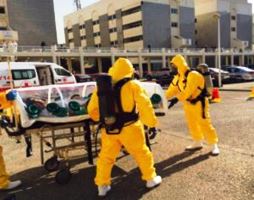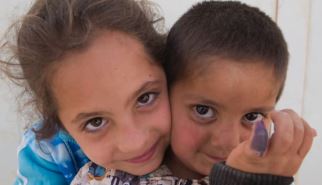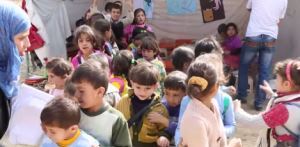National HazMat team formed
 Participants in action during the simulation training sessionsBeirut, 29 March 2016 – In view of the current instability in Lebanon’s neighbouring countries, the risk of exposure to hazards has increased. In this respect, WHO Lebanon proposed to train health staff on the medical management of potential cases exposed to these hazards, in addition to public health measures required to manage such risks. Moreover, such capacity-building is required as part of the International Health Regulations (IHR 2005).
Participants in action during the simulation training sessionsBeirut, 29 March 2016 – In view of the current instability in Lebanon’s neighbouring countries, the risk of exposure to hazards has increased. In this respect, WHO Lebanon proposed to train health staff on the medical management of potential cases exposed to these hazards, in addition to public health measures required to manage such risks. Moreover, such capacity-building is required as part of the International Health Regulations (IHR 2005).
In September 2015, a decision was taken by the Ministry of Public Health with the support of WHO to create a national HAZMAT medical team to be able to effectively play its role and responsibilities as a member in the Lebanese National CBRN team launched by the Prime Minister Mr Tammam Salam, with the European CBRN Centre of Excellence under the name of “Project 34”.
The overall goal of the project was to improve the preparedness and response capability of the Ministry of Health to deal with any potential threats generated from hazard incidents, including chemical, biological, nuclear and radiological materials.
13 training sessions were conducted between 16 November and 22 December for 242 participants from the Civil Defense, the Medical Team and the Lebanese Red Cross. The objectives of the trainings were to: create a multisectorial Hazmat team with different disciplines at the national level to face any CBRN event in Lebanon, ready 24/7 to respond to CBRN hazards exposures. In addition to the advanced training, WHO provided advanced level of personal protective equipment for the Hazmat team.
World Polio Day: polio outbreak stopped in Middle East, experts remain cautious
 25 October, 2015 | Beirut – Despite continuing conflict, declining immunization rates in conflict-affected areas and mass population displacement, no new polio cases have been reported in the Middle East for over 18 months, and experts believe the extensive multi-country outbreak response has been effective in stopping the outbreak.
25 October, 2015 | Beirut – Despite continuing conflict, declining immunization rates in conflict-affected areas and mass population displacement, no new polio cases have been reported in the Middle East for over 18 months, and experts believe the extensive multi-country outbreak response has been effective in stopping the outbreak.
The outbreak, which was detected when a case of polio was confirmed in northern Syria, paralysed 36 children in Syria and 2 in Iraq between October 2013 and April 2014, prompting fears of a major epidemic. In what has become the largest ever immunization response in the history of the Middle East, more than 70 mass immunization campaigns were implemented in 8 countries, aimed at reaching 27 million children with vaccine multiple times, and more than 200 million doses of vaccine were given.
The Syrian crisis 4 years on: WHO's health response in Lebanon
 The Syrian crisis 4 years on: WHO's health response in Lebanon
The Syrian crisis 4 years on: WHO's health response in Lebanon
4 August 2015 - Lebanon, a country with a total population of around 4.8 million, currently hosts more than 1.1 million Syrian refugees. This sudden increase in population has overstretched Lebanon's water, sanitation, housing and health care systems, with health implications for both refugees and the communities that host them.
WHO is working alongside the Ministry of Public Health and other partners to protect the health of all those who reside in Lebanon.
Watch this video from WHO Lebanon, to find out more.


